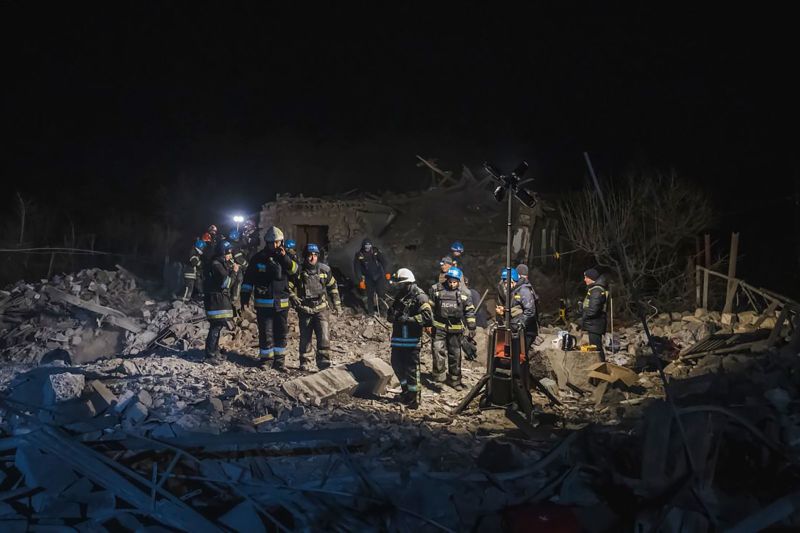
The Surprising Infestation: Rats, Mice, and the Frontlines of Ukraine's War

A surprising and unusual issue has arisen on the frontlines of Ukraine's war, as rats and mice infestations spread disease and wreak havoc among soldiers. The consequences of this infestation are far-reaching, impacting combat capability and creating conditions reminiscent of trench warfare in World War I. Let's delve into the details of this unexpected and alarming situation.
The Infestation
The frontlines of Ukraine's war have been struck by an unexpected and alarming infestation of rats and mice, causing widespread concern and disruption among soldiers. Reports indicate that the infestation has led to the spread of disease, resulting in debilitating symptoms such as vomiting and bleeding from the eyes. This dire situation has not only crippled combat capability but has also evoked memories of the grim conditions that characterized trench warfare in World War I.
A mousetrap in a garbage can tries to stem the swarm of rodents in a trenches near Bakhmut, Ukraine, in October 2023.
The infestations are attributed to a combination of factors, including seasonal changes and the mating cycle of the rodents. Additionally, the static nature of the war, following Ukraine's counteroffensive being rebuffed by heavily fortified Russian defenses, has provided an environment conducive to the proliferation of rodents. As a result, the nearly 1,000-kilometer frontline has become a breeding ground for mice, leading to the spread of disease and dissatisfaction among soldiers as they navigate the harsh winter conditions.
Efforts to address the infestation have been met with various challenges, with soldiers resorting to a range of methods to rid their bunkers of mice. From sprinkling poison to enlisting the help of a cat named Busia, soldiers have grappled with the relentless influx of rodents. Despite their best efforts, the infestation persists, posing a significant threat to the well-being and operational effectiveness of the troops.
The Impact on Soldiers
The infestation of rats and mice has had profound effects on the soldiers stationed on the frontlines, creating a challenging and distressing environment. Ukrainian servicewoman 'Kira' recounted the harrowing experience of her battalion being besieged by a 'mouse epidemic' in the southern Zaporizhzhia region. The presence of approximately 1,000 mice in her dugout, coupled with the relentless disturbances caused by the rodents, has taken a toll on the mental and physical well-being of the soldiers.
In addition to the psychological strain, the infestation has resulted in practical difficulties, with mice wreaking havoc on military and electrical equipment. Communication disruptions, vehicle malfunctions, and damage to critical infrastructure have further compounded the challenges faced by the soldiers. As they navigate the treacherous conditions of war, the presence of rodents has added a layer of complexity and danger to their already demanding circumstances.
Soldiers sleep in the dugout as they hold their positions in the snow-covered Serebryan Forest in Donetsk region, in January 2024.
Furthermore, the spread of disease associated with the infestation has posed a serious health risk to the soldiers. The outbreak of 'mouse fever' among Russian units, along with reports of ghastly symptoms including fevers, rashes, and hemorrhages, has significantly compromised the combat capability of the troops. The impact of these health concerns on the overall readiness and effectiveness of the military forces is a cause for grave concern.
In this photo provided by the Ukrainian Emergency Service, firefighters examine the site of Russia's missile attack that hit an apartment building in Pokrovsk, Ukraine, on Saturday, January 6.
Addressing the Challenge
As the infestation continues to pose a significant threat to the frontlines of Ukraine's war, the need for effective measures to address the issue is paramount. While historical parallels can be drawn to the trench warfare of World War I, it is imperative to approach the current situation with innovative and strategic solutions. The coordination of efforts to control the rodent population, mitigate the spread of disease, and safeguard critical infrastructure is essential to ensure the well-being and operational readiness of the soldiers.
Three German soldiers display their winnings after a night of rat-catching in a Western Front trench during World War I.
Moreover, the impact of the infestation on combat capability underscores the urgency of implementing comprehensive measures to counter the proliferation of rodents and mitigate the associated risks. From leveraging advanced pest control methods to enhancing surveillance and sanitation practices, a multifaceted approach is necessary to effectively tackle this unanticipated challenge. The collaboration of military and civilian entities, coupled with the deployment of specialized resources, will be instrumental in addressing the complexities of the infestation and safeguarding the frontlines of Ukraine's war.
As Ukraine confronts the enduring impact of the infestation amidst the rigors of winter, the resilience and resourcefulness of the soldiers remain pivotal in navigating this unprecedented challenge. By prioritizing the well-being and operational effectiveness of the troops, concerted efforts can be directed towards mitigating the adverse effects of the infestation and maintaining the readiness of the military forces in the face of this unanticipated threat.










